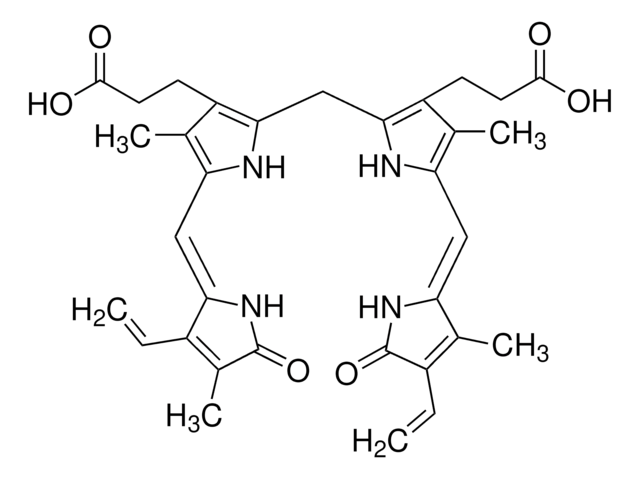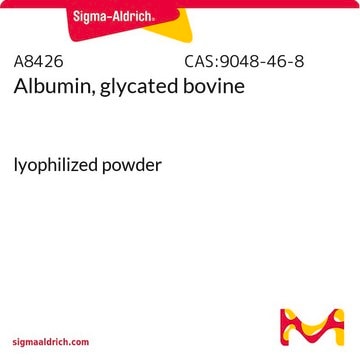Recommended Products
biological source
human
Quality Level
Assay
90-100% protein basis (biuret)
form
lyophilized powder
extent of labeling
1-5 mol hexose (as fructosamine) per mol albumin
technique(s)
cell culture | mammalian: suitable
UniProt accession no.
storage temp.
−20°C
InChI
1S/C3F8/c4-1(5,2(6,7)8)3(9,10)11
InChI key
QYSGYZVSCZSLHT-UHFFFAOYSA-N
Gene Information
human ... ALB(213)
General description
Albumin gene is mapped to human chromosome 4q13.3. It is synthesized as a preproalbumin with 609 amino acids in the liver. The mature albumin comprising 585 residues, is generated by the cleavage of signal peptide. Albumin is the major circulating protein in serum. It comprises three domains (I, II and III), each of which is subdivided into two subdomains A and B. A total of six ligand binding site is associated with albumin. Domain IIA and IIIA harbor small heterocyclic or aromatic compounds binding site. Long-chain fatty acid binding sites is present in IB and IIIB domains.
Application
Albumin, glycated human has been used:
- as a component of serum-free medium for retinal microglia activation
- to stimulate immortalised proximal tubule epithelial (HK-2) cells for fibronectin production
- as medium supplement in human retinal microvascular endothelial cells (HRMECs) cultures to test its effect on family with sequence similarity 18, member B (FAM18B) expression
Naturally occurring glycated albumin is a sensitive indicator of glycemic control by diabetic patients.
Biochem/physiol Actions
Albumin is crucial for physiological processes and is the major transporter for lipids, metal ions and amino acids. It has antioxidant functionality and binds to drugs as well. Mutation in the albumin gene is implicated in an autosomal recessive disorder called Analbuminemia, which is characterized by low levels of albumin. The major glycation site is lysine 525 in albumin. Glycated albumin is a marker of glycemia in diabetes mellitus patients and is useful in assessment of HbA1c based glycemic control.
Physical form
Lyophilized powder containing citrate buffer salts
Preparation Note
Glycated in vitro
Other Notes
View more information on human serum albumin.
Disclaimer
RESEARCH USE ONLY. This product is regulated in France when intended to be used for scientific purposes, including for import and export activities (Article L 1211-1 paragraph 2 of the Public Health Code). The purchaser (i.e. enduser) is required to obtain an import authorization from the France Ministry of Research referred in the Article L1245-5-1 II. of Public Health Code. By ordering this product, you are confirming that you have obtained the proper import authorization.
Storage Class Code
12 - Non Combustible Liquids
WGK
WGK 2
Flash Point(F)
Not applicable
Flash Point(C)
Not applicable
Certificates of Analysis (COA)
Search for Certificates of Analysis (COA) by entering the products Lot/Batch Number. Lot and Batch Numbers can be found on a product’s label following the words ‘Lot’ or ‘Batch’.
Already Own This Product?
Find documentation for the products that you have recently purchased in the Document Library.
Customers Also Viewed
Role of FAM18B in diabetic retinopathy
Wang AL, et al.
Molecular Vision, 20(1), 1146-1146 (2014)
Stephanie D Burr et al.
Cells, 10(3) (2021-04-04)
Cardiovascular disease, specifically heart failure, is a common complication for individuals with type 2 diabetes mellitus. Heart failure can arise with stiffening of the left ventricle, which can be caused by "active" cardiac fibroblasts (i.e., myofibroblasts) remodeling the extracellular matrix
Mizuho Nakayama et al.
Nature communications, 11(1), 2333-2333 (2020-05-13)
Missense-type mutant p53 plays a tumor-promoting role through gain-of-function (GOF) mechanism. In addition, the loss of wild-type TP53 through loss of heterozygosity (LOH) is widely found in cancer cells. However, malignant progression induced by cooperation of TP53 GOF mutation and
Kevin P O'Rourke et al.
Nature biotechnology, 35(6), 577-582 (2017-05-02)
Colorectal cancer (CRC) is a leading cause of death in the developed world, yet facile preclinical models that mimic the natural stages of CRC progression are lacking. Through the orthotopic engraftment of colon organoids we describe a broadly usable immunocompetent
A novel mutation in the albumin gene (c. 1A> C) resulting in analbuminemia
Caridi G, et al.
European Journal of Clinical Investigation, 43(1), 72-78 (2013)
Our team of scientists has experience in all areas of research including Life Science, Material Science, Chemical Synthesis, Chromatography, Analytical and many others.
Contact Technical Service











